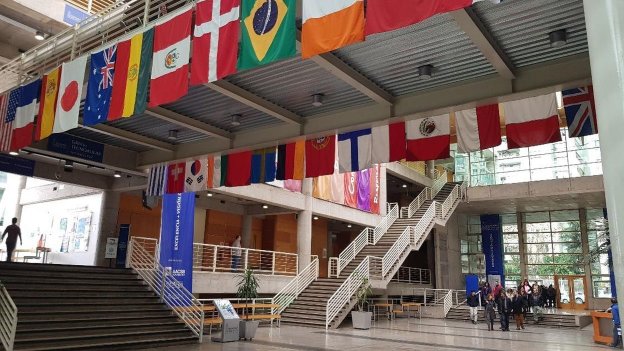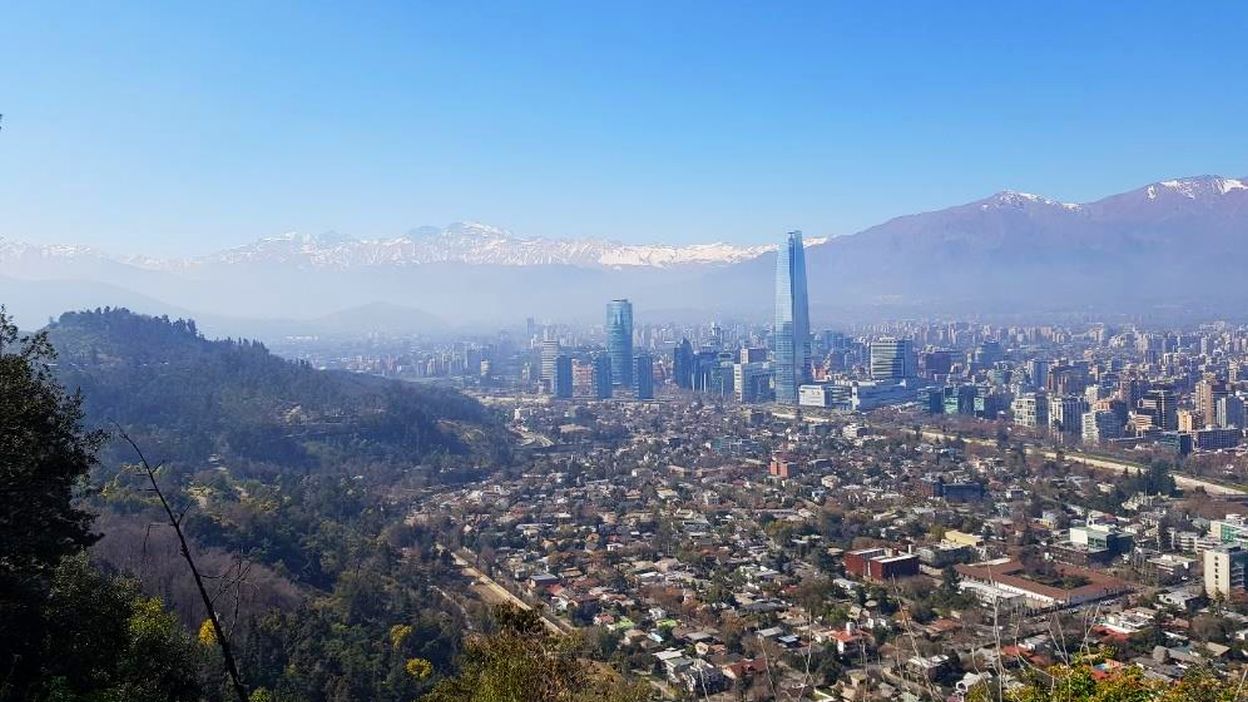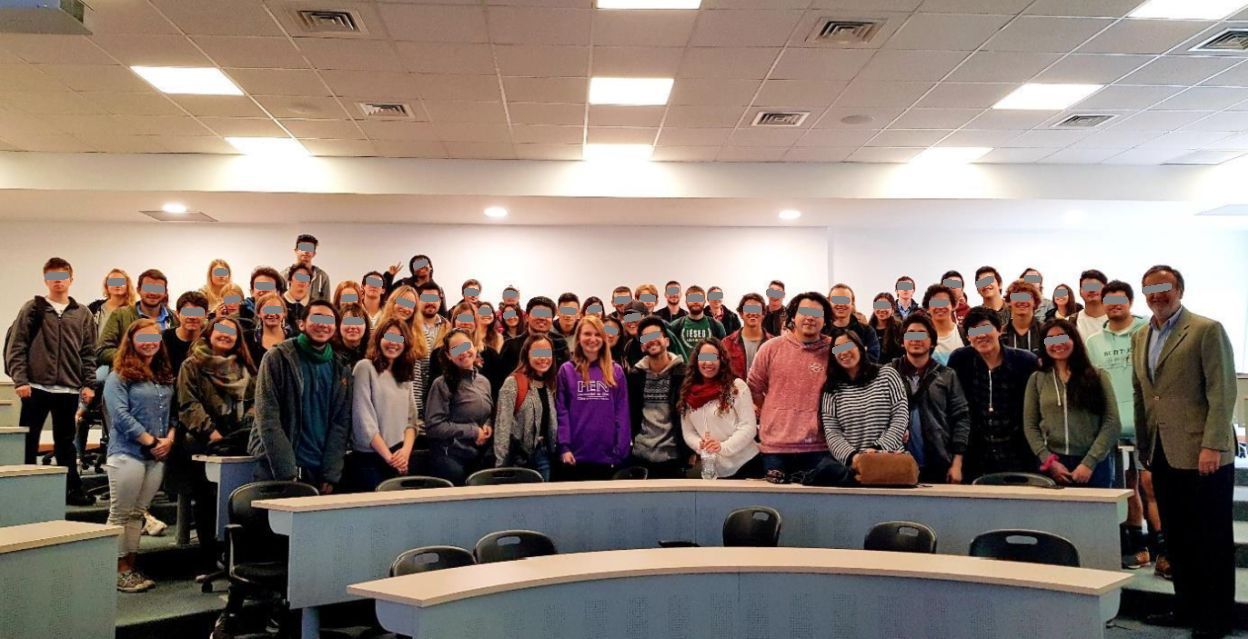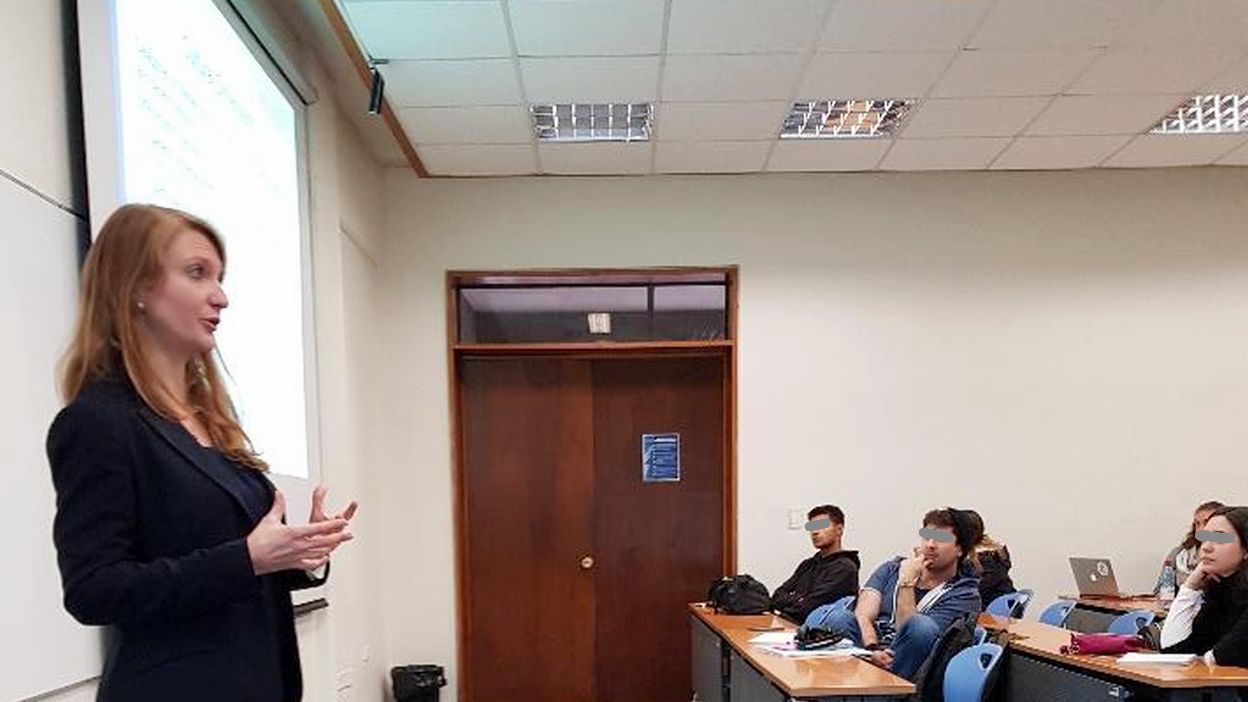Madeleine Bausch
 Privat
Privat
The Facultad de Economía y Negocios of the Universidad de Chile
"I learned so much – not only for my empirical study but also as a person. All the people I met were incredibly open-minded and willing to help. I would especially like to thank all those involved, who enabled me to have this wonderful stay and to continue my studies so well."
Madeleine Bausch is a German PhD candidate who thanks to the Gustav Schübeck Scholarship of the DAAD-Stiftung was able to work on her empirical study in Chile and Brazil.
In a detailed report she talks about her academic progress as well as cultural impressions that she was able to collect in the course of her research stay:
Thanks to the short-term grant from the DAAD foundation, I was able to spend a seven-week research and teaching stay in Brazil and Chile with the Gustav Schübeck Scholarship as part of my doctoral studies. For my doctoral thesis, I deal with intercultural transfer processes of quality management practice applied by German family businesses in Brazil. My original plan had been to conduct the study in Chile, which is why I got in touch with professors from the Universidad de Chile about six months before my stay, planning to visit the Department of Economics (Facultad de Economía y Negocios, FEN for short) as a guest lecturer.
I spent the first three weeks of my seven weeks in Latin America in Brazil, where I conducted research at a different company every week: one week in São Paulo, one week in São Leopoldo (in the south of Brazil) and one week in Guaratinguetá (federal state of São Paulo). I did more than 30 interviews and collected numerous documents for my data analysis. Then I spent three weeks in Santiago de Chile. Professor Erich Spencer Ruff had invited me to teach two units each in three different courses at Universidad de Chile. After visiting Chile, I spent another nine days in Brazil, as I had been able to arrange for interviews with the Head of HR and the CEO of a company for my empirical study. I also used this final week to meet professors from my discipline in São Paulo and to network. I am determined to maintain these contacts in the long term.
As the scholarship funded my stay in Chile as a guest lecturer in particular, I am now going to speak about this part in more detail.
Chile – a country nestled between the ocean and the Andes

Privat
Santiago de Chile looking from Cerro San Cristóbal
„En el último lugar del mundo“ – Chile is truly at the end of the world. I spent three weeks in Santiago de Chile, the capital city that is nestled between the ocean and the Andes. The city that has a population of 6 million is located in the valley between the Andes mountain range and the coastal mountain range. The views from the top of the hill Cerro San Cristóbal, which I visited right after my arrival, are particularly stunning.
July and August are winter months, so I was able to enjoy beautiful views of the snow-capped Andes. Sadly, these can usually be seen only after rainfalls, when the air has been cleared of vehicle emissions and dust. The photo may look sunny, but it was still pretty cold when I arrived. It does get quite cold in Chile, especially at night. Most houses are not equipped with central heating, so you can get cold easily. But at least there are fan heaters and hot showers!
The day following my arrival was a Monday, and I started at the university right away. Before I share more about my work and life in Chile, I am going to touch upon my preparations.
1. Organization
I had lived in Chile for a longer period of time before, so I already knew about the great importance of personal contacts and networks. Unlike in Germany, it is not enough to just send a single email to attract the attention of a professor. So I sent my email a number of times and when I visited Chile on holiday in March, I stopped by in Santiago in person to introduce myself. We connected right away: Professor Erich Spencer Ruff also works as a guest lecturer at a number of different higher education institutions in Southern Germany and is very familiar with the German language and culture.
To cut a long story short: thanks to the personal contacts I had established with Professor Acuña Aguirre and Professor Spencer Ruff, I quickly received an invitation to the university. My original plan had been to teach an entire seminar at FEN. However, this was not possible as no block seminars are offered in the bachelor’s programmes of the Universidad de Chile and master’s seminars must only be held by lecturer’s with a PhD. My stay was organised mostly by Professor Erich Spencer Ruff and Stefanie Dacín, a very friendly and open-minded lady from the university’s international students’ office.
Professor Spencer Ruff eventually offered that I could teach a number of lessons in three different courses at FEN. In the end I gave 2 or 3 teaching units each in the courses Negócios I (lead by Professor Erich Spencer Ruff), Intercultural Business Challenges in Latin America (lead by Verónica Uribe) and International Management (lead by Gabriela Schulten).

Privat
Madeleine Bausch's class „Negócios I“
We agreed that I should present the classes in English, as it is the desire and goal of the university to increase teaching in English. However, I did hold one of the Negócios classes in Spanish. In addition to teaching, I introduced the professors and staff members to the topic of my doctoral thesis, the team of my chair in Passau and the projects pursued at the chair on 5 September. On this occasion, I was able to present and discuss some initial results of my empirical study conducted in Brazil.
2. Working life and teaching experience
Erich (people in Chile address each other by their first names) received me very warmly on my first day. It was fascinating to see how he arranged for everything within just an hour: an office, internet access, contact to other professors, and so on. In intercultural communication we speak of polychronic cultures: cultures in which people handle a number of things simultaneously. Germany, for example, is a monochronic culture, as we take care of one thing after the other.
At the end of this one hour, an office in the international office was made available to me. My colleagues Mattias and Natalia were happy to help and answer all my questions.
However, I generally only spent the days on which I had classes at the university. I prepared my classes at the place I stayed. The reasons for this was that road traffic is always very busy in Santiago and there is a lot of smog in the air. So I tried to leave the house as little as possible.
On the whole I would describe teaching in Chile as a very interesting and rewarding experience. Classes are significantly bigger than in Germany (about 30 to 70 students) and the students are a heterogeneous mix from all around the world with many exchange students. Participation turned out to be an unexpectedly big aspect of teaching: the students joined the discussion and contributed their own ideas and suggestions. However, this was in part due to my teaching style that featured many discussion questions and questions to my audience.
Something I really noticed was the role of the teaching language: despite the fact that I only held one class in Spanish, I had the impression that Spanish was a lot more effective with regard to knowledge transfer than English. However, this might have been due to the fact that the level of English skills is not very pronounced yet (and my own Spanish skills are also better). A large share of the Chilean students joined in on the discussions and they were a lot more ‘person-oriented’, also in this context. I had initially expected that students in Chile would be rather shy (owing to the power distance in intercultural communication), but my experience proved me wrong. I would be happy to teach a Chilean class in Spanish again at any time!

Privat
Madeleine Bausch teaching at the Universidad de Chile
My overall impression of working conditions at FEN was very good. All professors and colleagues welcomed me warmly, they always tried to make a comfortable workplace available to me and helped me with any questions I had. We also had lunch together a few times. However, the good conditions at FEN do not represent the usual standard of the country: as a private university, the Universidad de Chile (and the department of economics in particular) receives some funding from the business sphere and is therefore able to support high-quality education. This was reflected by the state-of-the-art seminar rooms (usually featuring two screens, beamers and a computer) and the modern building in particular. Only the university’s location is slightly inconvenient: at the heart of the city centre, you are surrounded by noise and smog, which was especially strong in the winter months July and August. However, this is inevitable in any major city in Latin America.
3. Housing, life and leisure
For practical reasons, I initially booked an Airbnb apartment near the university. However, I had to leave this place after five days, as the condition of the apartment was poor and the landlord was not very accommodating. I also would not recommend staying in the city centre of Santiago, because of the busy road traffic and strong smog. The buildings feature very bad insulation, so it can quickly get very cold inside those houses in winter. July and August are the coldest months of the year. After those five days, I cancelled the Airbnb place and moved in with friends in the district of Vitacura. I had to travel on public transport for about 45 minutes to commute to FEN from there, but this is still reasonably „close“ for Santiago.
IIn my free time, I exercized a lot – I ran to the top of Cerro San Cristóbal – and I met up with old friends. We went out together, shared meals and had a typical Chilean ‘carrete’: a house party. However, as I was not on holiday and the work from my department in Germany was still on my mind, I spent a large share of my free time working. As soon as I found the time, I also started to transcribe my interviews that I had conducted in Brazil in the context of my empirical study.
4. Advice for all those who would like to visit Chile as guest lecturers:
- It is important to establish contact to professors even before your stay in Chile. Personal contact and taking an interest in people is key in Chile, to be able to communicate effectively and efficiently and to reach your goals (such as being invited to the host university). It can also help to just meet up with the person and have a coffee or food together. Preserving harmony and affection play an important role in Chilean society.
- Winters in Chile are cold: temperatures were unexpectedly low in August. Few houses have central heating. My advice is therefore to wrap up and wear warm clothes. However, only July and August are winter months. Spring arrives quite rapidly in September and it gets very warm.
- Factor in enough time: Chile is a polychronic country where time is handled very flexibly. This is why you should always factor in plenty of time (especially in Santiago) for your commute to work (rush-hour traffic is extremely intense in the city) but also at work, in case you spontaneously end up spending time with your colleagues afterwards.
- Being able to speak Spanish is essential for a stay in Chile. While many people do speak English by now, you will get much further with Spanish (both professionally and for private purposes). It goes without saying that it also enables you to exchange knowledge far more effectively.
- Regarding accommodation, I recommend to start by seeking information about the different districts. While accommodation near the university may seem very attractive, I would not recommend it because of the traffic noise in the city centre, and it is also not considered to be very safe at night. I would recommend looking for an apartment in Providencia or near the no. 1 metro line (línea roja), for example.
- Lunch: people usually have very late lunches in Santiago. Being German, I was used to having lunch at around 1 p.m. However, many Chileans do not eat until about 2:30 or 3 p.m. To make sure you don’t go hungry, I recommend always carrying something to eat to prevent your blood sugar levels from dropping too low.
I am very glad on the whole that I did this research and teaching stay in Brazil and Chile. I learned so much – not only for my empirical study but also as a person. All the people I met were incredibly open-minded and willing to help. I should add though, that I had spent longer periods of time in both countries in the past, am fluent in both languages and was familiar with both cultures. This was enormously helpful when it came to communicating with locals and reaching my goals.
My special thanks go to Rita Hartmann and Stefanie Lohmann and the contact partners from the DAAD, especially Frederick Stamm, who enabled me to perform this wonderful stay and to continue my studies so well. I would also like to thank Erich Spencer and Stefanie Dacín for their hospitality, for receiving me so warmly in Chile and for making my teaching stint possible.
As of September 2018. The German version is the original.


